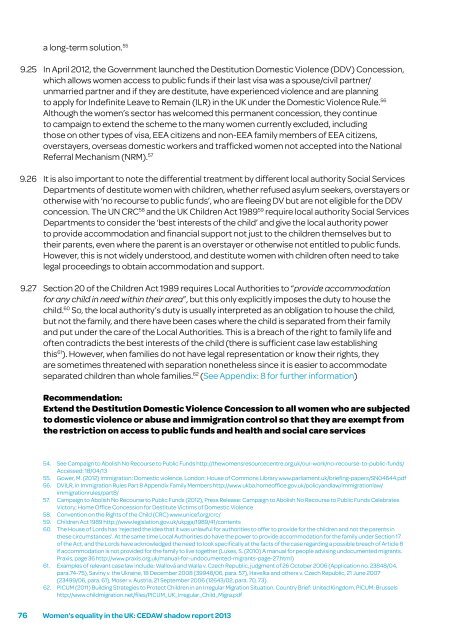Women’s equality in the UK – A health check
Women’s equality in the UK – A health check
Women’s equality in the UK – A health check
Create successful ePaper yourself
Turn your PDF publications into a flip-book with our unique Google optimized e-Paper software.
9.25<br />
9.26<br />
9.27<br />
a long-term solution. 55<br />
In April 2012, <strong>the</strong> Government launched <strong>the</strong> Destitution Domestic Violence (DDV) Concession,<br />
which allows women access to public funds if <strong>the</strong>ir last visa was a spouse/civil partner/<br />
unmarried partner and if <strong>the</strong>y are destitute, have experienced violence and are plann<strong>in</strong>g<br />
to apply for Indef<strong>in</strong>ite Leave to Rema<strong>in</strong> (ILR) <strong>in</strong> <strong>the</strong> <strong>UK</strong> under <strong>the</strong> Domestic Violence Rule. 56<br />
Although <strong>the</strong> women’s sector has welcomed this permanent concession, <strong>the</strong>y cont<strong>in</strong>ue<br />
to campaign to extend <strong>the</strong> scheme to <strong>the</strong> many women currently excluded, <strong>in</strong>clud<strong>in</strong>g<br />
those on o<strong>the</strong>r types of visa, EEA citizens and non-EEA family members of EEA citizens,<br />
overstayers, overseas domestic workers and trafficked women not accepted <strong>in</strong>to <strong>the</strong> National<br />
Referral Mechanism (NRM). 57<br />
It is also important to note <strong>the</strong> differential treatment by different local authority Social Services<br />
Departments of destitute women with children, whe<strong>the</strong>r refused asylum seekers, overstayers or<br />
o<strong>the</strong>rwise with ‘no recourse to public funds’, who are flee<strong>in</strong>g DV but are not eligible for <strong>the</strong> DDV<br />
concession. The UN CRC 58 and <strong>the</strong> <strong>UK</strong> Children Act 1989 59 require local authority Social Services<br />
Departments to consider <strong>the</strong> ‘best <strong>in</strong>terests of <strong>the</strong> child’ and give <strong>the</strong> local authority power<br />
to provide accommodation and f<strong>in</strong>ancial support not just to <strong>the</strong> children <strong>the</strong>mselves but to<br />
<strong>the</strong>ir parents, even where <strong>the</strong> parent is an overstayer or o<strong>the</strong>rwise not entitled to public funds.<br />
However, this is not widely understood, and destitute women with children often need to take<br />
legal proceed<strong>in</strong>gs to obta<strong>in</strong> accommodation and support.<br />
Section 20 of <strong>the</strong> Children Act 1989 requires Local Authorities to “provide accommodation<br />
for any child <strong>in</strong> need with<strong>in</strong> <strong>the</strong>ir area”, but this only explicitly imposes <strong>the</strong> duty to house <strong>the</strong><br />
child. 60 So, <strong>the</strong> local authority’s duty is usually <strong>in</strong>terpreted as an obligation to house <strong>the</strong> child,<br />
but not <strong>the</strong> family, and <strong>the</strong>re have been cases where <strong>the</strong> child is separated from <strong>the</strong>ir family<br />
and put under <strong>the</strong> care of <strong>the</strong> Local Authorities. This is a breach of <strong>the</strong> right to family life and<br />
often contradicts <strong>the</strong> best <strong>in</strong>terests of <strong>the</strong> child (<strong>the</strong>re is sufficient case law establish<strong>in</strong>g<br />
this 61 ). However, when families do not have legal representation or know <strong>the</strong>ir rights, <strong>the</strong>y<br />
are sometimes threatened with separation none<strong>the</strong>less s<strong>in</strong>ce it is easier to accommodate<br />
separated children than whole families. 62 (See Appendix: 8 for fur<strong>the</strong>r <strong>in</strong>formation)<br />
Recommendation:<br />
Extend <strong>the</strong> Destitution Domestic Violence Concession to all women who are subjected<br />
to domestic violence or abuse and immigration control so that <strong>the</strong>y are exempt from<br />
<strong>the</strong> restriction on access to public funds and <strong>health</strong> and social care services<br />
54. See Campaign to Abolish No Recourse to Public Funds http://<strong>the</strong>womensresourcecentre.org.uk/our-work/no-recourse-to-public-funds/<br />
Accessed: 18/04/13<br />
55. Gower, M. (2012) Immigration: Domestic violence. London: House of Commons Library www.parliament.uk/brief<strong>in</strong>g-papers/SN04644.pdf<br />
56. DVILR, <strong>in</strong> Immigration Rules Part 8 Appendix Family Members http://www.ukba.homeoffice.gov.uk/policyandlaw/immigrationlaw/<br />
immigrationrules/part8/<br />
57. Campaign to Abolish No Recourse to Public Funds (2012), Press Release: Campaign to Abolish No Recourse to Public Funds Celebrates<br />
Victory; Home Office Concession for Destitute Victims of Domestic Violence<br />
58. Convention on <strong>the</strong> Rights of <strong>the</strong> Child (CRC) www.unicef.org/crc/<br />
59. Children Act 1989 http://www.legislation.gov.uk/ukpga/1989/41/contents<br />
60. The House of Lords has ‘rejected <strong>the</strong> idea that it was unlawful for authorities to offer to provide for <strong>the</strong> children and not <strong>the</strong> parents <strong>in</strong><br />
<strong>the</strong>se circumstances’. At <strong>the</strong> same time Local Authorities do have <strong>the</strong> power to provide accommodation for <strong>the</strong> family under Section 17<br />
of <strong>the</strong> Act, and <strong>the</strong> Lords have acknowledged <strong>the</strong> need to look specifically at <strong>the</strong> facts of <strong>the</strong> case regard<strong>in</strong>g a possible breach of Article 8<br />
if accommodation is not provided for <strong>the</strong> family to live toge<strong>the</strong>r (Lukes, S. (2010) A manual for people advis<strong>in</strong>g undocumented migrants.<br />
Praxis, page 36 http://www.praxis.org.uk/manual-for-undocumented-migrants-page-27.html)<br />
61. Examples of relevant case law <strong>in</strong>clude: Wallová and Walla v. Czech Republic, judgment of 26 October 2006 (Application no. 23848/04,<br />
para.74-75), Sav<strong>in</strong>y v. <strong>the</strong> Ukra<strong>in</strong>e, 18 December 2008 (39948/06, para. 57), Havelka and o<strong>the</strong>rs v. Czech Republic, 21 June 2007<br />
(23499/06, para. 61), Moser v. Austria, 21 September 2006 (12643/02, para. 70, 73).<br />
62. PICUM (2011) Build<strong>in</strong>g Strategies to Protect Children <strong>in</strong> an Irregular Migration Situation. Country Brief: United K<strong>in</strong>gdom. PICUM: Brussels<br />
http://www.childmigration.net/files/PICUM_<strong>UK</strong>_Irregular_Child_Migra.pdf<br />
76 <strong>Women’s</strong> <strong>equality</strong> <strong>in</strong> <strong>the</strong> <strong>UK</strong>: CEDAW shadow report 2013


